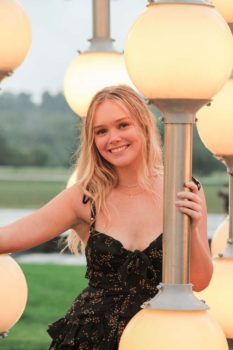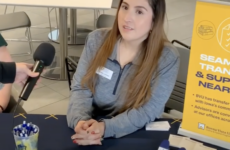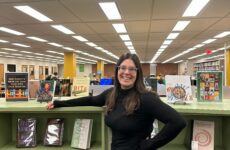
Claire Pollard, from Norwalk
Like many people after high school, Claire Pollard found a job working in retail. For three years the 19-year-old Norwalk native worked at Old Navy but late last year she made the switch and began working for a very different type of business: a funeral home.
(For the sake of wanting to be as truthful as possible, Pollard asked to keep the name of the funeral home private. )
While a clothing store and a funeral home are two very different things it did not push Pollard away — if anything it was the change she needed to find a career path that would work for her.
“I chose mortuary science because it seemed like the first and only job that I could actually see myself doing,” Pollard said.
Pollard was apprehensive at first to jump right into mortuary science which led her to decide to start working at a funeral home as a way to get her feet wet.
“The best decision I ever made was working in a funeral home environment before committing to the program,” Pollard said.
Her motive behind mortuary science wasn’t only rooted in joining the program at DMACC or finding a future career but also in exploring and gaining a deeper understanding of the emotions that correlate with death and grieving.
“I love talking about death and everything that comes with it because it’s the one thing that we all share in common; it’s inevitable and no one is safe from experiencing grief or death,” Pollard said.
Mortuary science and working in a funeral home are much more than an education path or job to Pollard. There is a passion for her in the emotional understanding that comes with death. Whether it is her or the grieving family, Pollard has come to see firsthand how emotions play a critical role in the death process.
She said she has come to understand mortality as a whole but also strengthened her relationship with the idea of death.
“Prior to working there I always thought about my own mortality and those close to me because it’s interesting to think that at any moment we can be gone. I’ve always had a healthy relationship with death; the concept itself has never scared me,” Pollard said.
She said the emotional side of things was one of her most impactful parts about working in a funeral home. Pollard said it has given her a reality shift and a new perspective on life and death.
“The average person only experiences death when it’s someone they know so being around it so often has allowed me to have a detached perspective,” Pollard said.
While the job has been rewarding for Pollard she still has faced a few challenges along the way. The biggest struggle she said is realizing how demanding this job has been hours-wise, especially as a student.
“I’m only a student right now so I only experience a minuscule amount of exhaustion, but recognizing the toll it takes on the people I work with scares me,” Pollard said.
The demand of the job is something that not only Pollard has experienced but something her co-workers who have done it for years have also talked about.
“It’s a never-ending business, that’s fast-paced. I’ve had the privilege to work with people who are honest with me, and don’t sugarcoat the realities; it’s a taxing job,” Pollard said.
Another challenge Pollard faced was understanding just how taxing her job could really be. She talked about the turnaround rate in a funeral home is surprisingly big with the average funeral director staying in the business for five years. Due to the high demand this job has she shares that the fear of becoming overwhelmed within the job is something she does have.
“The burnout rate is fast and it’s a fear that I have to consistently face but at the end of the day this job has changed my perspective in so many ways that I will carry with me for the rest of my life whether I’m working in this business for two more months or 20 more years,” Pollard said.
She added that funeral directors spend so much of their time and life overall dedicated to making sure that families get the goodbye that they want and need. While it is very physically and emotionally taxing she understands how important of a job it is.
“I think if you are passionate about what you do, it helps balance out the ugliness but there’s no denying that it’s hard,” Pollard said.
For those who have also thought about getting into mortuary science, Pollard recommends getting exposure to the life of it first before deciding that’s what you want to do.
“You have to do it for the right reasons because if you aren’t passionate about what you’re doing, you’re going to get run down really fast. So I would say, expose yourself and reach out to a funeral home because they are always looking for extra help,” Pollard said.





Comments